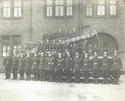 The First World War created a predicament for Glasgow Fire Brigade when, in 1915, the Firemaster reported that forty of his men had enlisted in to the Forces placing a strain on the remainder. A letter was sent to Lord Kitchener drawing his attention to this problem and on 30th November 1915 a brigade exemption was granted.
The First World War created a predicament for Glasgow Fire Brigade when, in 1915, the Firemaster reported that forty of his men had enlisted in to the Forces placing a strain on the remainder. A letter was sent to Lord Kitchener drawing his attention to this problem and on 30th November 1915 a brigade exemption was granted.
 Between the wars, Glasgow Fire Brigade developed slowly, but gradually increasing personnel numbers each decade. By 1920 personnel stood at 195, in 1930 there were 199 fire fighters, and by 1940 another forty-five men had been recruited to increase the establishment to 244. Breathing Apparatus made its first appearance in the early 1930s and specialised appliances such as the Rescue Tender followed. This appliance was designed to carry eight breathing apparatus sets and much of the other special equipment that the firemen now required to deal with a diverse range of emergencies.
Between the wars, Glasgow Fire Brigade developed slowly, but gradually increasing personnel numbers each decade. By 1920 personnel stood at 195, in 1930 there were 199 fire fighters, and by 1940 another forty-five men had been recruited to increase the establishment to 244. Breathing Apparatus made its first appearance in the early 1930s and specialised appliances such as the Rescue Tender followed. This appliance was designed to carry eight breathing apparatus sets and much of the other special equipment that the firemen now required to deal with a diverse range of emergencies.
 Because of the Munich Crisis, the Auxiliary Fire Service was formed in 1938 with a view to enabling fire brigades in Scotland to be ready for war. Over the next three years the Auxiliary Fire Service succeeded in expanding Glasgow's fire brigade by thirty-three auxiliary fire stations manned by 813 full-time and 2,298 part-time firemen - a massive increase compared to the pre-war manning figures. Glasgow Fire Brigade and all the other Scottish brigades were absorbed into the National Fire Service in August 1941 where they would remain under the jurisdiction of the Secretary of State until denationalisation in 1948 resulted in the creation of independent local fire brigades once more.
Because of the Munich Crisis, the Auxiliary Fire Service was formed in 1938 with a view to enabling fire brigades in Scotland to be ready for war. Over the next three years the Auxiliary Fire Service succeeded in expanding Glasgow's fire brigade by thirty-three auxiliary fire stations manned by 813 full-time and 2,298 part-time firemen - a massive increase compared to the pre-war manning figures. Glasgow Fire Brigade and all the other Scottish brigades were absorbed into the National Fire Service in August 1941 where they would remain under the jurisdiction of the Secretary of State until denationalisation in 1948 resulted in the creation of independent local fire brigades once more.